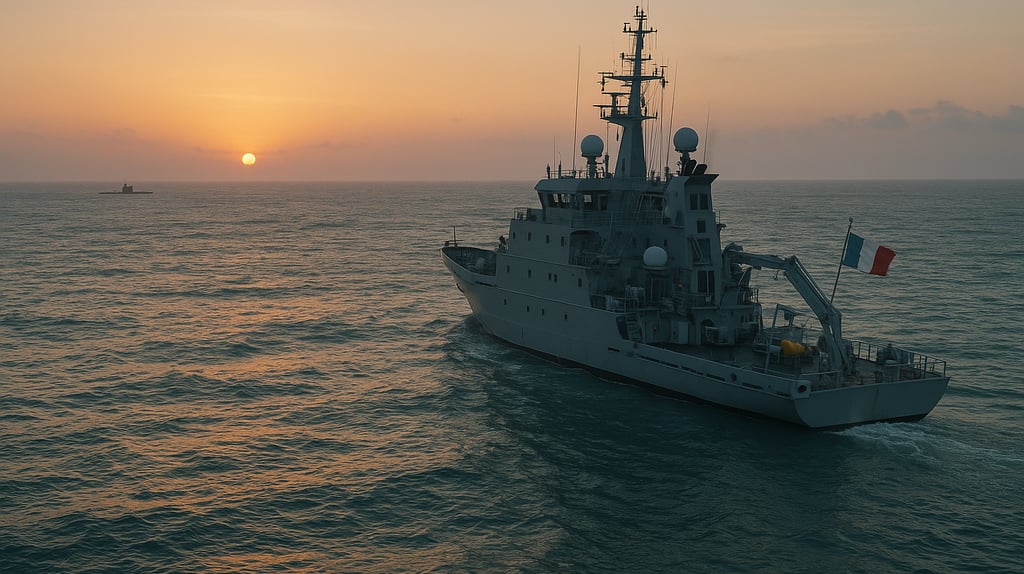Indian Ocean : Why is France investing so heavily in this vast maritime expanse ?
ASIA
Thomas Dos Remedios
6/18/20254 min read


At the heart of the Indian Ocean, an immense space through which some 20,000 ships pass every year, France maintains a strategic presence that goes far beyond the simple management of its overseas territories. Through its islands such as Reunion and Mayotte, France deploys a comprehensive maritime policy, combining sovereignty, security, economic development and environmental protection. In a rapidly changing geopolitical context, this region represents a major challenge for France.
UNRIVALLED MARITIME SOVEREIGNTY IN THE INDIAN OCEAN
France has one of the world's largest exclusive economic zones in the Indian Ocean, covering some 5.6 million square kilometers. This immense maritime space, which extends around La Réunion, Mayotte, the Éparses Islands and the French Southern and Antarctic Lands, is a real strategic and economic asset. Sovereignty issues are at the heart of France's concerns. Some areas, notably the Éparses Islands, are subject to claims by neighboring countries such as Madagascar, which disputes French legitimacy over several islands. Mauritius also lays claim to Tromelin. These territorial disputes are a reminder that sovereignty is never definitively acquired, and must be actively defended. For France, it's a question of preserving its rights at sea, which guarantee the exclusive exploitation of natural resources such as fishing, potential hydrocarbons and the mineral resources of the continental shelf.
On the ground, France translates this sovereignty into a constant, operational presence. The Centre régional opérationnel de surveillance et de sauvetage (CROSS) Sud Océan Indien, based on La Réunion, is a concrete example of this intervention capability. Using radar, satellites and maritime communications, the CROSS constantly monitors these vast expanses, intervening to prevent accidents, collisions or pollution, and providing a vital link with ships in difficulty. The center is on alert 24 hours a day, embodying France's vigilance in this maritime area. This intensive surveillance is essential in a region where commercial traffic is dense and growing fast. With increasing flows bypassing the Suez Canal via the Cape of Good Hope - a direct consequence of tensions in the Middle East - pressure on these waters is intensifying, making French management all the more crucial.
AN ACTIVE MILITARY FORCE TO GUARANTEE REGIONAL SECURITY
France not only has an administrative presence in the Indian Ocean, it also deploys a robust military force there, through the Forces armées de la zone sud de l'océan Indien (FAZSOI). Nearly 1,900 military personnel, mainly based on La Réunion and Mayotte, provide a comprehensive surveillance, deterrence and intervention capability. This force includes patrol vessels, frigates, maritime surveillance aircraft and, increasingly, UAVs, providing extensive and effective coverage. Their role is crucial in the face of several concrete threats: piracy off the Horn of Africa, arms and drug trafficking, illegal fishing that destabilizes local economies, and rising geopolitical tensions between regional powers.
Since the attacks by the Houthis in the Gulf of Aden, global maritime traffic has partially shifted, resulting in a 20-30% increase in ship traffic in the Indian Ocean. This development calls for heightened vigilance, as well as enhanced operational capacity. France is therefore investing heavily to modernize its equipment, guarantee rapid intervention, and cooperate closely with neighboring countries to secure these vital routes. This military presence not only defends French interests, but also contributes to regional stability, the protection of island populations and the smooth running of international maritime trade.
PRESERVING OUR NATURAL HERITAGE AND BLUE ECONOMY
Beyond questions of sovereignty and security, the Indian Ocean represents an exceptional, yet fragile, natural heritage for France. French waters in this region are home to some of the richest marine biodiversity in the world, with coral reefs, endemic species and complex ecosystems. France is home to around 90% of the country's marine biodiversity, thanks to its ultramarine zones. The French Southern Territories, in particular, are a protected area of inestimable scientific and environmental value, where fishing is strictly controlled and research into the effects of climate change is intensive. France is conducting programs to study rising temperatures, melting ice and changes in marine habitats.
At the same time, artisanal and industrial fishing represent a major economic challenge for local populations, particularly in Mayotte and La Réunion. Sustainable management of these resources is therefore essential to maintain the balance between economic development, food security and environmental conservation. France is also committed to combating marine pollution, from accidental spills to the proliferation of plastic waste. The CROSS Sud Océan Indien plays a major role in the early detection of such pollution, making it possible to identify the vessels responsible and initiate legal proceedings.
REGIONAL COOPERATION, THE KEY TO SHARED GOVERNANCE
France cannot act alone in an area marked by a multiplicity of states, cultures and interests. For this reason, it is actively involved in regional cooperation schemes, such as the Indian Ocean Rim Association (IORA), which brings together riparian countries around common objectives. These include maritime safety, the fight against illegal fishing, natural resource management and biodiversity protection. In Mauritius, for example, the NGO Expertise France is playing a key role in helping member states strengthen their surveillance and control capacities, and develop a sustainable blue economy.
These partnerships help to create a stable regional framework, where tensions are eased through dialogue and concerted action. They also testify to France's determination to support the harmonious development of the islands and populations of the Indian Ocean, taking into account the historical, cultural and economic realities specific to each territory.
Thomas dos Remedios, pour SPECTIO
The opinions expressed are those of the authors and do not reflect the position of Think Tank Spectio.
